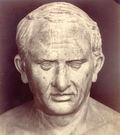Difference between revisions of "Persuasion"
Conservative (Talk | contribs) (→Books) |
Conservative (Talk | contribs) (→Books) |
||
| Line 39: | Line 39: | ||
== Books == | == Books == | ||
| − | + | [[Image:Cicero statue head.jpg|thumb|right|120px|Marcus Tullius [[Cicero]] ]] | |
''See also:'' [[Cicero]] | ''See also:'' [[Cicero]] | ||
Revision as of 01:11, April 6, 2024
Persuasion involves influencing a person's beliefs, attitudes, intentions, motivations, or behaviours.[2]
Contents
Aristotle's rhetoric
See also: Aristotle
"Aristotle, the ancient Greek philosopher, suggested that any spoken or written communication intended to persuade contains three key rhetorical elements: logos, the logic and reasoning in the message; ethos, the character, credibility and trustworthiness of the communicator; and pathos, the emotional dimension." - Aristotle’s three modes of persuasion
Aristotle's rhetoric - Stanford Encyclopedia of Philosophy
- Aristotle's rhetoric - Stanford Encyclopedia of Philosophy
Robert Cialdini's six principles of influence
Dr. Robert B. Cialdini is a seminal expert in the field of influence and persuasion. He did years of high-quality research for companies and nonprofits to find out how to influence people. His work is a "marketing Bible" to marketers, public relations people, etc. Robert Cialdini published his book “Influence: The Psychology of Persuasion” in 1984 which gave the 6 key principles related to influencing people which are: reciprocity, scarcity, authority, commitment and consistency, liking and consensus.[3]
A short explanation of Robert Cialdini's six principles of influence given at: Cialdini’s 6 Principles of Persuasion: A Simple Summary
Articles on Robert Cialdini's six principles of influence:
- How to Apply Cialdini’s Six Principles of Influence to Your Website
- Cialdini's Six Principles of Influence
- How to Use Cialdini’s 6 Principles of Persuasion to Boost Conversions
Winning arguments
- How to win an argument, Time magazine
Espionage, spy skills and persuasion
- Agent of Influence: How to Use Spy Skills to Persuade Anyone, Sell Anything, and Build a Successful Business by Jason Hanson. Dey Street Books (June 4, 2019)
Books

See also: Cicero
- How to Win an Argument: An Ancient Guide to the Art of Persuasion by Marcus Tullius Cicero. Princeton University Press (October 31, 2017)
External links
- Keys to persuasion, Time magazine
- 21 principles of persuasion
See also
References
- ↑ Aristotle’s three modes of persuasion
- ↑ Gass, Robert H. Seiter, John S. (2010). Persuasion, social influence, and compliance gaining (4th ed.). Boston: Allyn & Bacon. p. 33. ISBN 978-0-205-69818-9.
- ↑ Cialdini’s 6 Principles of Persuasion: A Simple Summary
